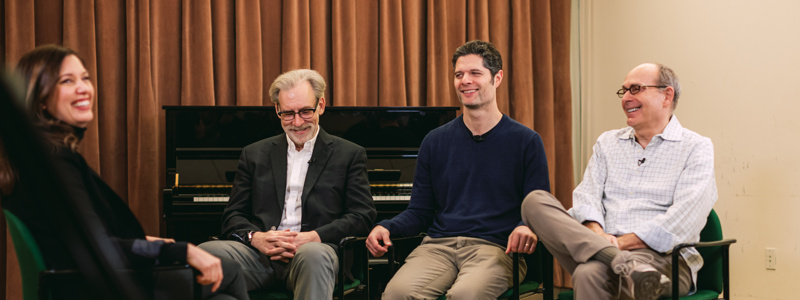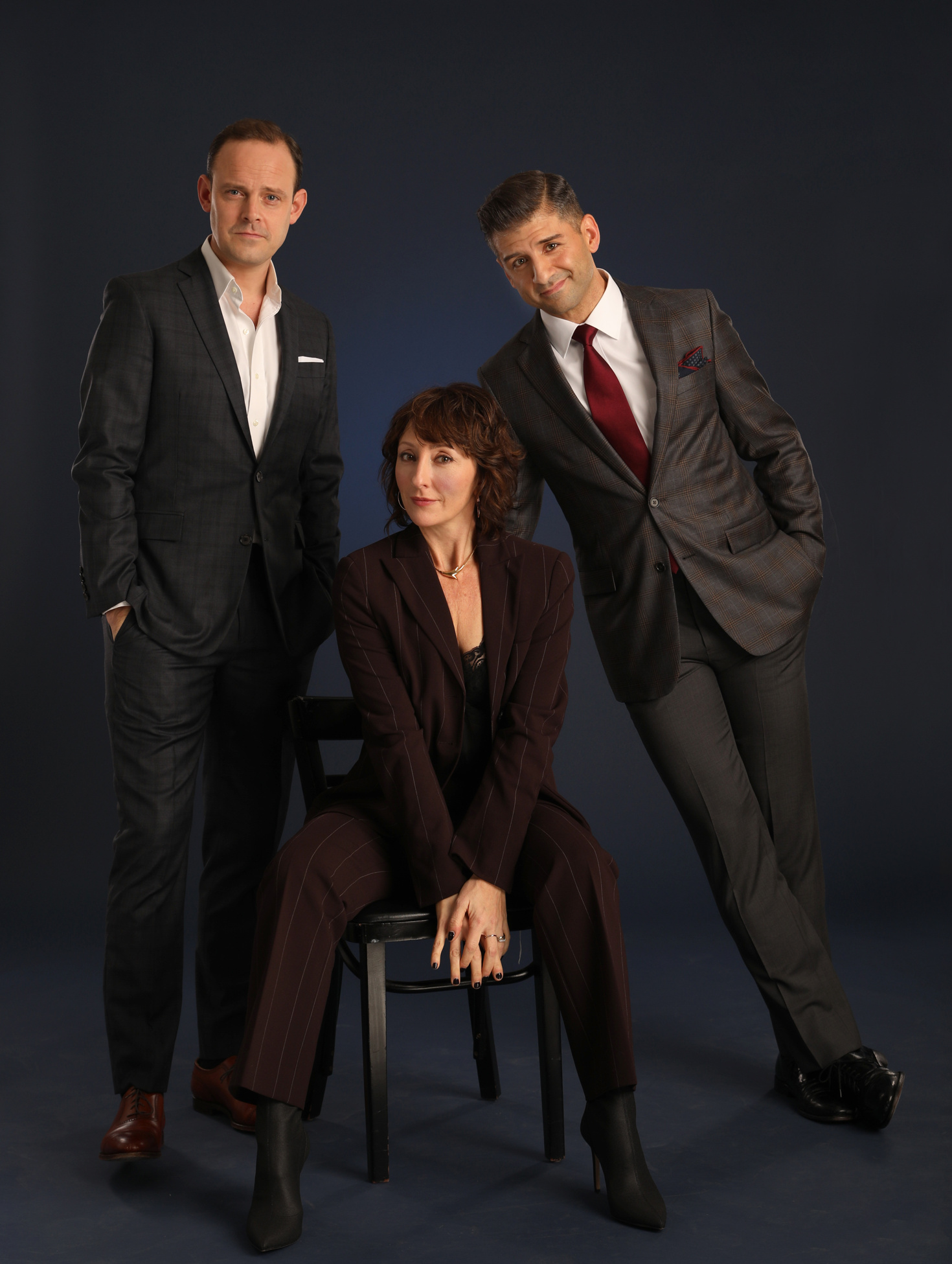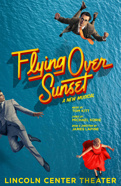
(Photos by Emilio Madrid for Broadway.com)
Flying Over Sunset Creators James Lapine, Tom Kitt and Michael Korie on Why Their New Musical Is a Trip

Years before Timothy Leary popularized psychedelic experimentation, LSD found a home in Hollywood. Lysergic acid diethylamide—then legal—was used in elite circles during the 1950s, employed in hush-hush psychiatric treatments. Flying Over Sunset, a new musical at Lincoln Center Theater, uses that relatively unknown history to tell the story of three public figures in crisis, not the hedonistic excesses usually associated with psychedelia.

Written and directed by three-time Tony-winning scribe James Lapine with Tony-winning composer Tom Kitt and Tony-nominated lyricist Michael Korie, Flying Over Sunset imagines a shared acid trip between Hollywood leading man Cary Grant (Tony Yazbeck), conservative politician Clare Boothe Luce (Carmen Cusack) and novelist and early LSD enthusiast Aldous Huxley (Harry Hadden-Paton). In real life, each used the drug in the 1950s: Grant entirely committed himself to the new psychotherapy, (re)-reinventing his life, Luce discovered the treatment from her friend Gerald Heard (Robert Sella) and, in 1954, Huxley authored the now famous psychedelic text, The Doors of Perception, each turning to LSD for deep introspective help.
But “it’s not about the drug,” said Korie in a recent Building Broadway interview with Beth Stevens. “It’s about sunset. It’s about reaching that time in your life when you’ve had accomplishments, where you’ve had disappointments, and you’re not yet complete.”
Lapine first began work on Flying Over Sunset after reading a 2010 Vanity Fair article that exposed LSD’s journey into the lives of nearly 100 luminaries. Psychiatrists, the article narrated, began employing LSD-25 in psychoanalysis after the U.S. Army and the C.I.A. discovered the drug could be used as a truth serum. For Lapine, that most of these Hollywood somebodies, privately in turmoil, operated publicly in (perhaps) the same circles offered an intriguing project.
"I knew it was going to be about deep human issues, and that LSD was going to be a vehicle to probe, to question and to look at hard truths, the way 'Into the Woods' isn’t about fairy tales."
“What I like about these three very accomplished, very brilliant people, was that they felt unfulfilled,” Lapine said. “They turned to the drug to find out more about themselves. They were not youngsters, you know. They were mid-career and mid-life. Each had a crisis point in their lives, and it wasn’t taken frivolously. Huxley really was upset when Leary made it a social event to take LSD, because he never thought of it that way. He thought of it as a kind of serious undertaking.”
The musical, almost dreamlike in nature, follows Grant, Luce and Huxley as they drop acid to explore the recesses of their memories, haunted by lost loved ones and figures from their past. “It starts in the early afternoon or late morning,” said Korie. “They each take the drug, different doses, and then it starts kicking in differently for each of them. They get giddy. They get crazy, and they start hallucinating. By then, it’s sunset and they’re looking at the sunset over the Pacific Ocean.”

At that moment, the metaphor at the heart of Flying Over Sunset—not of cruising high over Hollywood on new-age psychedelics, but of approaching the second half of one’s life—comes into focus. “Trying to understand the world they live in spoke to me,” Lapine said. “What are they going to do next? Cary Grant quit the movies. Clare Booth Luce had resigned as the ambassador to Brazil, and Aldous Huxley’s wife, with whom he’d been joined at the hip for 30-odd years, had passed away. Each of them were at a juncture in their lives trying to figure out what their next chapter was going to be,” he said. “That appealed to me, because, I guess, I felt the same way.”
Flying Over Sunset marks the first musical from Lapine in nearly 10 years. He is perhaps best known for his writing and directing partnership with composer/lyricist Stephen Sondheim on Sunday in the Park with George (1983), Into the Woods (1987) and Passion (1994), as well as his 1992 collaboration with William Finn on Falsettos.
Lapine has a knack for telling achingly human stories, whether it's an obsessive pointillist painter or a flawed fairy tale character. Flying Over Sunset is no different, said composer Kitt. “I knew it was going to be about deep human issues,” he said, “and that LSD was going to be a vehicle to probe, to question and to look at hard truths, the way Into the Woods isn’t about fairy tales.”
In this way, Flying Over Sunset isn’t so much about LSD as it is about using the drug to crack open the inner lives of its characters. This is “why you want to write musicals,” said Kitt. “You want to go into an imaginative, creative world—something that’s going to challenge you and demand the most of your imagination, not knowing what each moment is going to be, but just knowing that anything is possible.”
Watch Broadway.com’s Building Broadway segment on Flying Over Sunset below.

